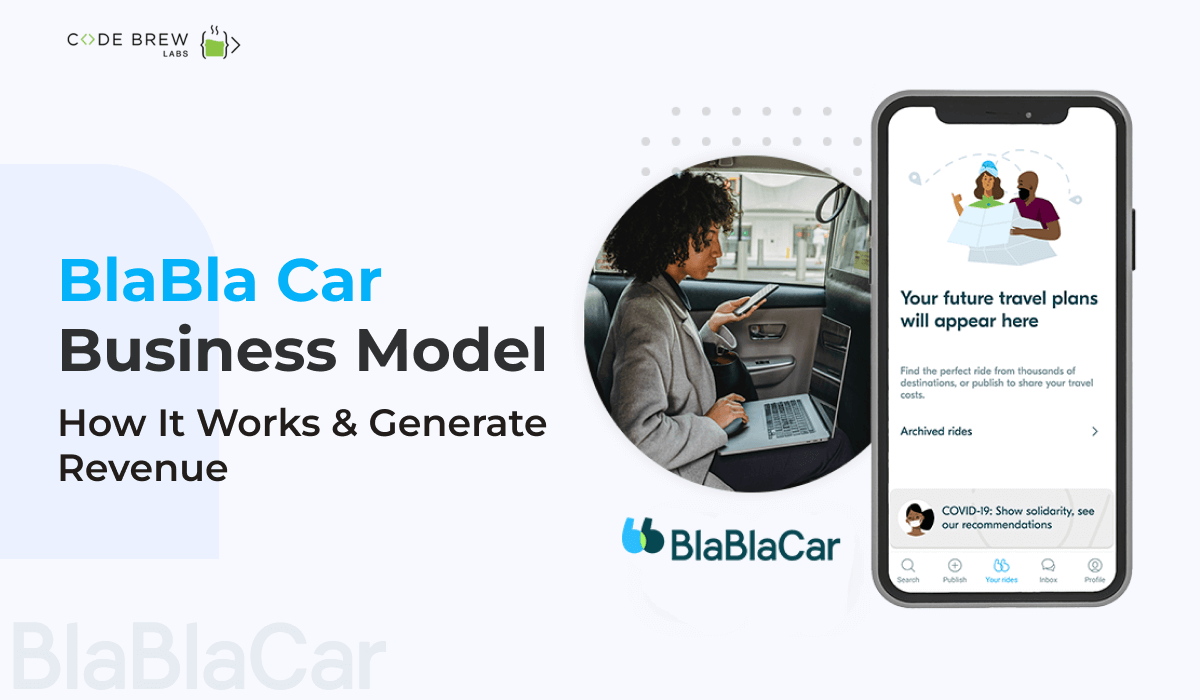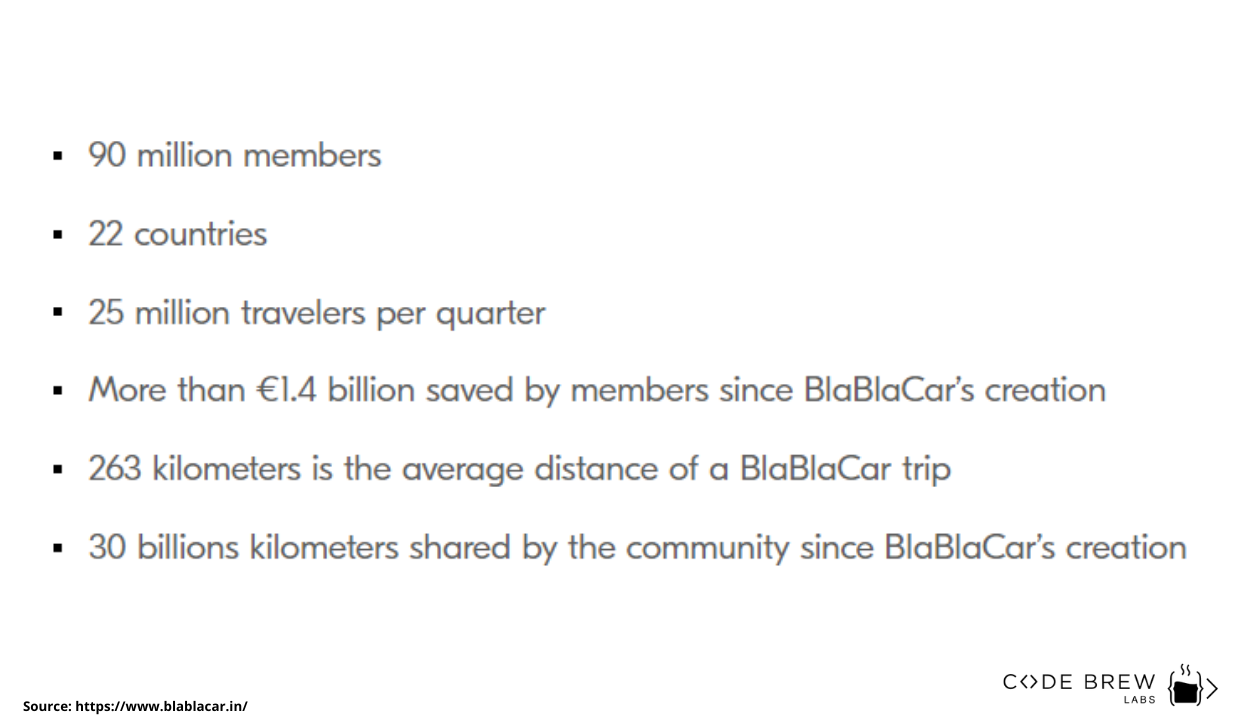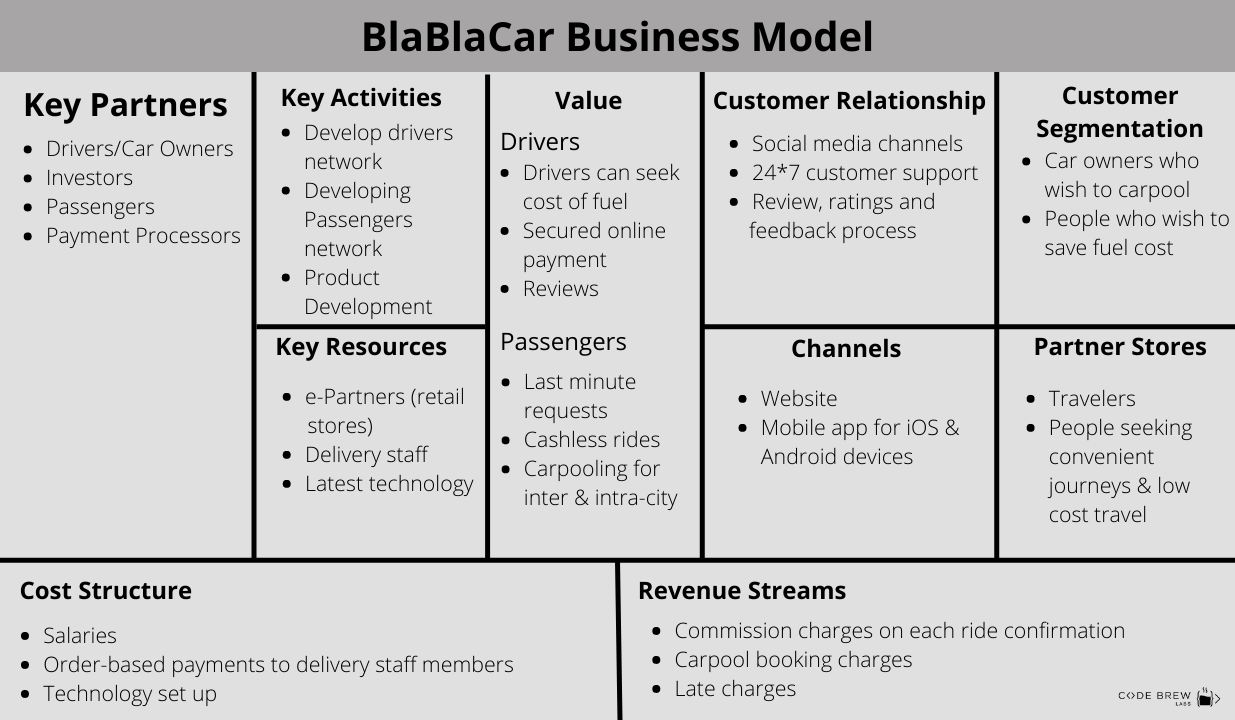
‘Save money and reduce the cost of fuel.’
Table of Content
This statement has become the new motto for the current generation. Eventually, this has led us to experience carpooling more often than we ever thought possible.
Now when talking about carpooling apps, it’s hard not to mention a brand like BlaBlaCar which has been gaining popularity for its unique and ultra-flexible taxi services. This French online carpooling marketplace is acting as a bridge between car owners and passengers who are willing to share the overall travel or fuel costs. AI Development Services are increasingly being used in similar platforms to enhance ride-matching algorithms, route optimization, and user personalization.
Giving you a closer look at one of the most preferred community-based travel networks – BlaBlaCar.

In 2019, BlaBlaCar announced revenue growth of 71% as compared to the previous year (2018). By then the profit has been accelerating for the brand making it a preferred name in the carpooling world.
It may interest you to know that every day more than 1,35,000 people travel using the BlaBlaCar services in France. The unbeatable success stories of BlaBlaCar have encouraged many entrepreneurs to get build and launch a BlaBlaCar-like carpooling app in the marketplace. AI Agent Development Solutions can further enhance such apps by automating real-time matching, predictive availability, and customer service interactions.
If you are considering getting developed and launching a BlaBlaCar clone app, here’s something important for you.
Let’s Get Started!
The first thing to know when thinking about developing a BlaBlaCar clone app is a business and revenue model.

This rideshare app consists of two app interfaces for – drivers/car owners and passengers. The car owners or drivers can put their vehicle on BlaBlaCar’s online app/portal to display it as available for accepting ride requests. Furthermore, the passengers get the liberty to find and request a ride for a location at nominal charges.
Drivers can create an account on the platform via a quick and easy sign-up process. This unlocks a series of features ranging from accepting ride requests and completing the tour.
Drivers can update the upcoming ride details including ride location, time, pickup, and drop exact location with a landmark for convenience. This helps the passengers to book a ride faster.
Drivers can leverage multiple third-party integrations incorporated for faster, easier, and safer transactions via the app. This ridesharing app consists of payment methods like a credit card, debit card, PayPal, UPI, etc.
The drivers get complete liberty of accepting or rejecting the upcoming ridesharing requests on the basis of a legit reason like – a different pickup/drop location, low ridesharing fare offered, etc.
The passengers can share their journey experience with the upcoming end-users through the review and rating features.
Drivers get the complete liberty to update the vehicle and ridesharing charges on the app. Plus, s/he can edit or update personal details like car vehicle number, personal information, etc. for users’ reference.
End-users can create a personalized account on the ridesharing app by entering unique credentials. This gives direct access to ride booking, rating, and many other features.
Search Drivers
Users can search for drivers or ridesharing options available for a particular location. Therefore, it helps in picking a ridesharing service provider with the lowest fare charges mentioned.
End-users can connect with the car owner/ridesharing provider/driver through messages or call feature. The calls and messages are initiated through the app itself to keep a track of communication done between two parties.
The users can rate and review the ridesharing experience to help the upcoming users book a ride comfortably without a doubt.
Admin gets complete control over the rides through an interactive dashboard. It enables you to add/remove and view the driver’s details, and trip details with one click.
Admin can add as many coupons and discounted deals to let users avail and book a ride without letting it cost a leg and an arm. This helps to expand and encourage more and more users to join the rideshare platform.
Rideshare app admin can view the entire list of active users riding or scheduling rides. This feature proves helpful to verify and keep track of all rides initiated in a particular region.
It is the responsibility of the admin to evaluate the total profit earned on each ride and split the share among the rideshare company and driver based on the decided percentage.
It’s essential to understand how it lets the drivers generate revenue before you hop on the mobile app development process. The app is built using a well-strategic plan consisting of multiple revenue generation streams. This ensures a 100% success rate for your business.
The drivers get a fair share of the fuel expenses for the journey. Furthermore, the total profit generated on each ride is split between the driver and the ridesharing service provider.
In 2021, BlaBlaCar announced the successful acquisition of Octobus. This became possible with the fundraising of $115 million. Octopus is one of the digital platforms used for digitizing multiple operational activities. In exchange for automating the processes, the ridesharing businesses seek a monthly or quarterly subscription fee. There are three plans available – basic, smart, and pro to choose from.
BlaBlaCar clone rideshare apps can see car insurance policies as a revenue-generating source. The app can offer drivers a car insurance policy covering protecting them against multiple risks like civil liability, weather-related mishappenings, broken glasses, theft cases, and much more.
We at Code Brew Labs hold decades of experience in developing and delivering on-demand ridesharing apps in 3 weeks. Our team of knowledge-rich developers works on the latest technology stack follows the agile methodology and evaluates your business needs minutely, so you can have a robust final product ready within weeks.
As of now, we have served up to 1000 businesses with a reliable & customizable ridesharing app yet we continue to strive and prove ourselves as a preferred on-demand app development company suiting your business needs. Be it developing and launching a BlaBlaCar clone app or developing a new concept from scratch, we have got you covered.
